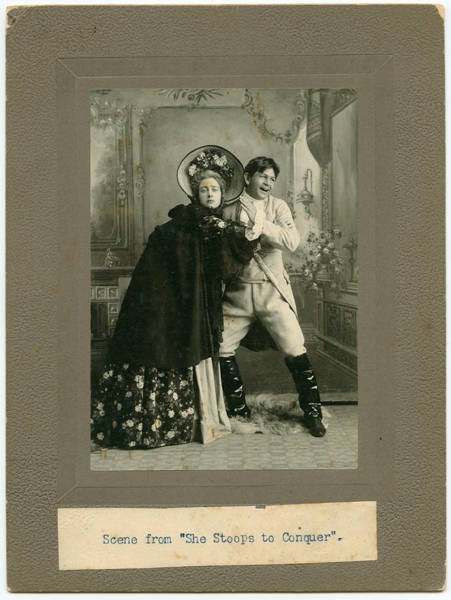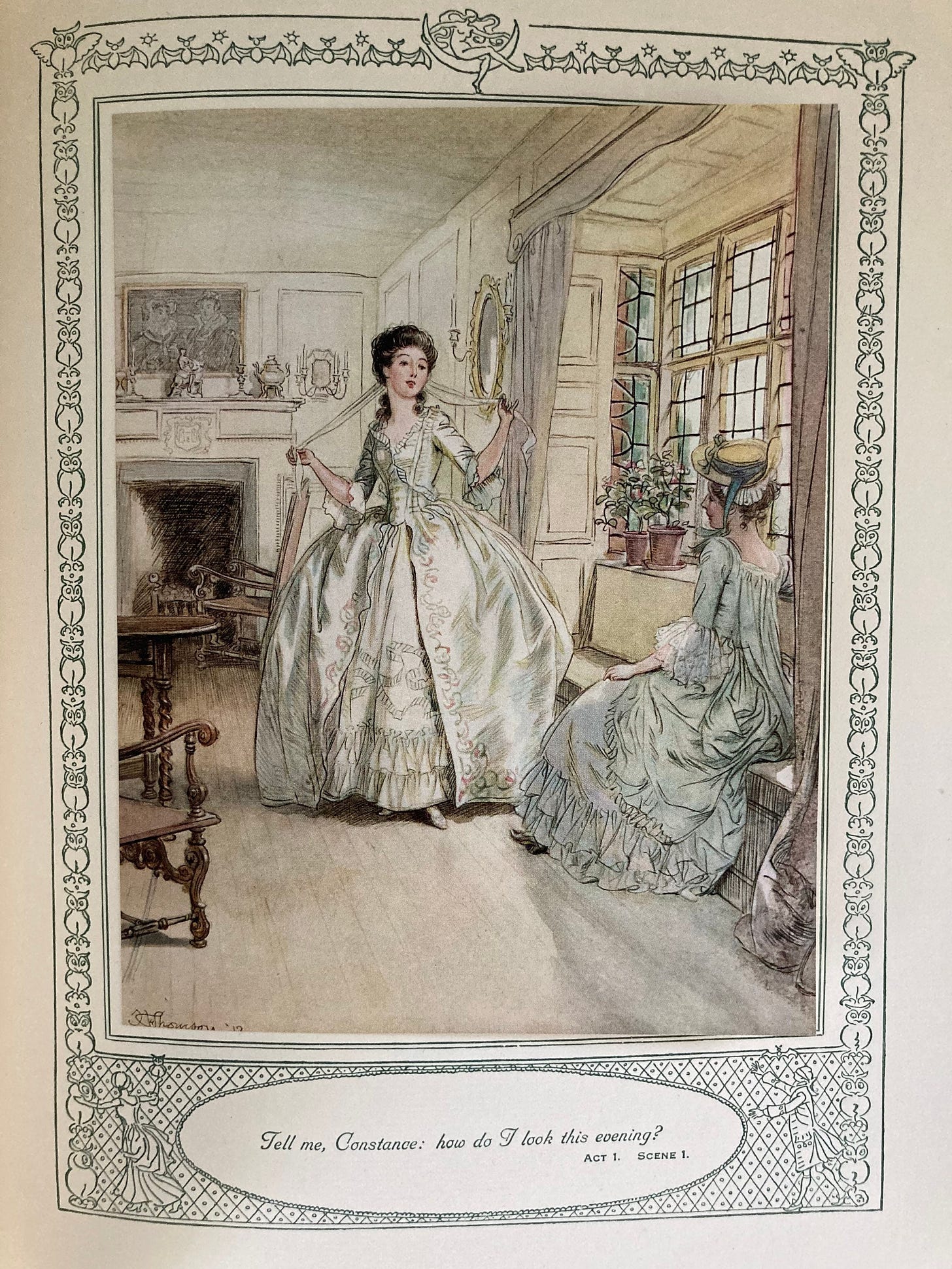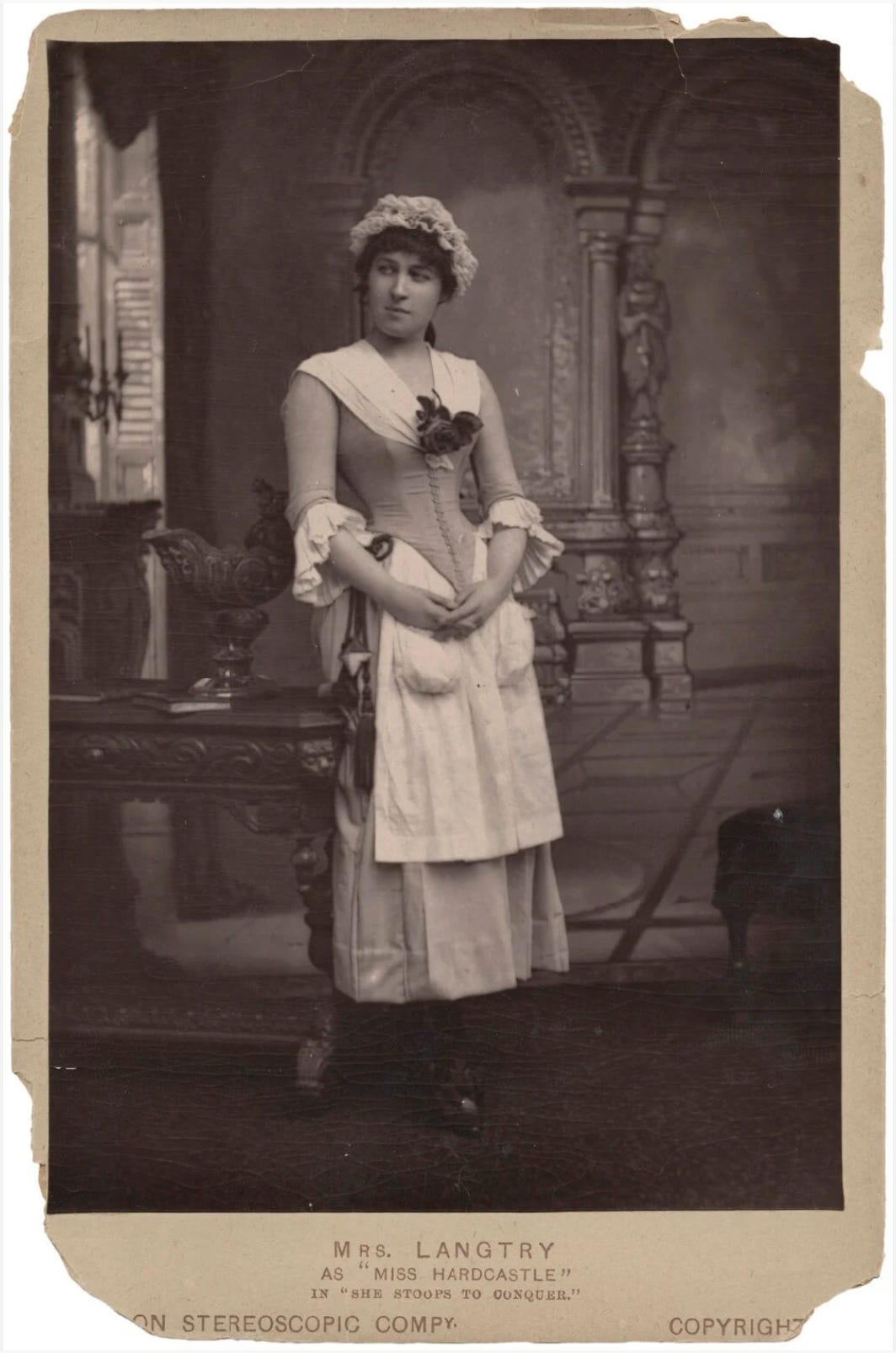She Stoops to Conquer staged by The Theater Company
An original NYC take not only on a classic play, but on a classic theater company.
If you’ve studied English literature — by that I mean not merely literature in that language, but from that island — or taken theater classes, a copy of Oliver Goldsmith’s She Stoops to Conquer likely passed across your desk. It’s a classic 1773 comedy that has odd staying power in even the American stage for a play that just celebrated its sestercentennial birthday merely three years prior to the United States’s own. Apologies to those of you who prefer sisesquicentennial, semiquincentennial, and quarter millennial, but I’m more of a “two and a half steps” guy myself. Further apologies to those of you who couldn’t care less.
Last Thursday, thanks to a favor from
, Tara and I found ourselves privileged enough to watch The Theater Company stage it in the East Village.You might recognize photos of, for instance, the 1900 Pacific University production:
Or the 1912 illustrated version:
Or perhaps even the 1881 picture of Lillie Langtry as Miss Hardcastle in 'She Stoops to Conquer' from the National Portrait Gallery in London:
My point is twofold: for one, this play is old and has been performed so, so many times since it was written for Oliver Goldsmith’s friends in The Club or Covent Garden Theatre; for another, there were no pictures from last Thursday’s production.
Because I didn’t want to take any?
Though I’m torn on pictures on a good day, generally preferring to savor experiences rather than worry about some Third Eye spying on us or transforming a personal experience into public voyeurism, in this case it didn’t matter. There are no pictures allowed of The Theater Company’s productions. They don’t have a website. They don’t advertise. They don’t have posters. There’s no Partiful invite, no Canva image, no postmarked invitation inside two envelopes. The only way you can even contact them is through begging to be invited to their private Insta. That’s it. If you’re wondering what goes up on their Instagram, it isn’t pictures. It’s courtroom sketches.
I’m not kidding. They hire artists to draw or paint renditions of the experience, realistic or abstract.
They don’t even hand out Playbills of any kind.
I mean short of using an NYPL main branch payphone to summon some Benedictine eunuch from Jersey who will bring you further instructions tattooed on the rump of a prize hog, the logistics of finding, paying, and attending their productions are about as Byzantine as they could get in the modern era. Byzantine in all of the ways that attracts someone like me, of course: this seeking to find the show is a feature, not a bug. It reminded me of some of the early obscurities I attended in Bushwick and Williamsburg my first few years in New York City.
You will think I’m exaggerating all of this, but I assure you the pig-carrying eunuch is true. Sorry, typo: I assure you everything but the pig-carrying eunuch is true. I Venmo’d my ticket payment. We tried multiple doors before we found the right one.
But when we arrived, there were signs mirroring the old τραγῳδία and κωμῳδία images with arrows. The signs were smily faces and frowns faces, perhaps the most Picasso version of those classic masks I’ve ever encountered. We made it down into the basement of a gracious church who has given them a better deal for a performance venue than anyone’s ever found in the East Village, including the old Upright Citizen’s Brigade theater.
The crew gave us ping pong balls wrapped in burlap and tied with twine. And a bowl. Like Le Pain Quotidien: the bowl was for our cup of free wine. We took our seats amid an absolutely packed house and Griffin, the boss and dude who founded the thing, really revved up the crowd into a shouting and laughing mess of mankind. He even gave an older stranger a chance to reveal a secret on stage — turns out this fellow audience member had almost taken his life a few years back. But he had chosen to life life for life’s sake. Griffin had us chant that for everyone.
They encouraged us to heckle. To boo. To cheer. To laugh. If we despised a performance, to throw our little burlap sacks. It was like some old Jewish prophet’s version of heckling: throw the sackcloth and ash at them.
The audience took this seriously.
All of this in mind before the play began, I knew I had seen all of this before, but not in my own era. They were blending the vaudeville spirit of theater with full length classic plays. Griffin and Tyler McLean and the crew know that the greatest playwrights wrote for companies. And so the best way to foster a company was to just get great at performing classic plays.
What better way to create an audience than to create a working class audience culture who not only enjoy classic plays, but also actively heckle the stars while they fail?
Isn’t that all the more fun?
It reminds me of the Edema Ruh people group from The Name of the Wind who live and die as traveling troupers not unlike the bards of Ireland or the Romani people who hosted the funeral of their king in my hometown of Salem, Illinois:
To truly understand what it was like, you must realize that nothing is so grand as a troupe showing off for one another. Good entertainers try to make each performance seem special, but you need to remember that the show they’re putting on for you is the same one they’ve put on for hundreds of other audiences. Even the most dedicated troupes have an occasional lackluster performance, especially when they know they can get away with it.
Small towns, rural inns, those places didn’t know good entertainment from bad. Your fellow performers did.
Think then, how do you entertain the people who have seen your act a thousand times? You dust off the old tricks. You try out some new ones. You hope for the best. And, of course, the grand failures are as entertaining as the great successes.
Rothfuss, Patrick. The Name of the Wind (The Kingkiller Chronicle Book 1) (p. 110-111). Astra Publishing House. Kindle Edition.
It seemed as often that their main audience was one another. And that’s what made it fun: they let us in on their fun.
You’re talking about a troupe that memorizes an entire classic play in a month (in this case, one that was three hours long), does not rehearse in the space where they will perform, performs it exactly once in basically the professional theater equivalent of a flash mob, tears it all down that night, cast becomes the crew between curtain and afterparty, and they start with the next one the next month. I hear they’ve already staged Dracula and A Christmas Carol, each for one performance. Each one gone like ice cream.
Oh, did I mention they don’t tell you the title? Ever? Not only do they not announce the play or give you a brochure of who is acting or any of that. No. They don’t even tell you what you’re about to watch before the curtain rises. If you know the first line, you know the play. If you don’t?
Tough. Have fun, grab your rotten tomato, and sink or swim with the script.
I’ll have to admit, for me this was magic. I know, having worked in theater and film, precisely how much work went into memorizing, casting, costuming, directing, “promoting” — through text messages in this case — and everything else. For them to do all of that in a month as young adults in New York working two to three jobs to pay rent?
This, my friends, astounds me. It beggars belief in a way.
So I didn’t care when they missed lines. They had literally armed us to heckle them. Actors who struggled (likely because of a rough month at their day job or with family) easily laughed off the boos and pulled out the script. Others fed lines to one another rather subtly. Still others would break character, curse loudly, and get ABSOLUTELY PEPPERED with burlap sachets.
Sometimes those who threw sachets in the middle of a good performance would find themselves on the receiving end of improvisational reprisal. Once this happened in the middle of a particularly important bit of banter and the actress who had been targeted was standing front center not three feet from the audience member who’d thrown the sachet. She turned back to face him and sneezed on him, then returned to the performance.
Everyone — even the perpetrator of the heckling — loved it and laughed so, so hard.
I never threw mine.
Because to me, the whole performance was a magic trick. Even the missed lines, even the missed cues, even the awkward silences. Perhaps especially those because you watched, actively, as they dug themselves out of holes in the midst of a classic play. The audience reaction filled in the mercy and grace needed in those moments because the audience knows how hard it is to do what they did that night. And every month they do it again.
For those unaware of the plot of She Stoops to Conquer, I would normally give a spoiler alert for what follows. But it’s a play from 1773. So. I suppose read at your own discretion, but it’s 250-years-old. At some point, spoiler purists must concede to the gravity of time:
ACT I
An extremely traditional old Mr. Hardcastle (played by Tyler) lives in the countryside and his wife nags him about the need to go into the city. Mr. Hardcastle loves everything old, including his wife. Their immature son Tony (played by a free spirited woman) loves pranks. This whole first scene was on point and hilarious. Sometimes I feel like the audience was laughing just at the sheer oldness of the scene. But it was great.
Regarding Tony: as you know from Bell Hammers, I think there are serious consequences for pranksters obsessed with pranks.
Kate, the daughter of Hardcastle, comes in with extremely fashionable clothing that Hardcastle hates — he prefers her to dress more old-fashioned. His friend Sir Charles has a son named Marlow coming to visit: he’s handsome, smart, and painfully modest. Kate loves it all but the last little bit and hopes to make a good impression.
Her cousin Constance knows Marlow because she knows his best friend, Hastings. Constance tells Kate that Marlow’s so shy around high-class women he chooses to seduce low-class women. And she also knows that Mrs. Hardcastle keeps politicking for Constance to marry her first cousin, Tony the prankster, to keep the family jewels in the family. Constance doesn’t want mom to know she loves Hastings. And Tony doesn’t want to marry her.
Hastings and Marlow (Griffin) show up at a bar where Tony and his buddies are drinking. Tony, the nephew of Mr. Hardcastle, tells them he’ll lead them to an inn.
It’s not an inn. It’s Mr. Hardcastle’s.
Act II
Hardcastle’s giving his servants, Tony’s drinking buddies, lessons on behaving in front of guests. The Theater Company had one of their ladies play one of these menservants and it was doubly funny because of that, again a long tradition in both Greek and British theater.
Marlow and Hastings arrive and Hardcastle’s baffled by how rudely and presumptuously they treat him, especially considering his friend Sir Charles’s recommendation. Similarly the two are shocked at how the “innkeeper” is treating him. Marlow wants to see his room, Hardcastle obliges.
This interaction — between Tyler and Griffin — seems to me to be the crux of the company. It’s not that any other performance is lacking, but there’s a chemistry there from working together and friendship that seems to have blossomed in the kind of trust typically only seen in really great improv troupes.
Et al:
Rather than rehearse the whole play, you can see the setup from here: Marlow’s so embarrassed upon meeting Kate that he bows halfway to the ground and refuses to make eye contact or speak. Kate then decides to pose as a low class girl and hit on him and he falls for her. The jewels go back and forth between Tony and Hastings, and Hardcastle — with a bit of help from Sir Charles — hides to watch his daughter, pretending to be low class, extract a profession of love from the ignorant Marlow (who had, up until now, expressed his distinct disinterest in Kate, though he’d hardly seen her). There’s a wedding, happily ever after, etc. Read the play here or the wiki here if you need more.
The cast did wonderfully with this piece. Even the ones who struggled through their lines (you’ll notice I omitted who and when) truly worked the chemistry with the audience, worked the hecklers, worked the play.
And that’s really the wonder of both this piece and this company to me:
They’re reviving classic works of literature to a young, paying audience, with less than a month to work on each one.
It will not surprise me in the least, assuming this company continues for a decade, if they end up writing and performing one of history’s great works of theater. They have the group, the chemistry, the consistent audience who cares more about the company and her players than whatever classic story is the soup of the day. Each of these actors are actively learning classic lines from classic works, one after the other after the other. It’s the Beatles in Hamburg in 1960, but it’s not the British pop invasion we’re talking about. It’s The Theater Company.
All that’s left is for them to begin writing for one another. Writing classic roles they know their friends can play for this specific audience.
As you look for holiday gifts this year, keep in mind that I’ve written several books:
My novel Bell Hammers, though “hilarious,” has been critically acclaimed in every review outlet that has covered it. It’s a great gift for a blue collar man who needs a fun story, equally for readers who like literary pieces, picaresques, family sagas, pranks, historical fiction, or who feel the need to understand middle America right now.
If you have a child in your life, I have two picture books. One is Harry Rides the Danger and the other is The Elevator Out.
Of Gods and Globes III features multiple well-known science fiction and fantasy authors writing stories about astronomical (or mythological) influence.
The Greenwood Poet will feed the hearts of the poet in your life, the melancholy goth or emo kid, or just the death obsessed artsy fartsy type.
Tap and Die parodies Die Hard in a fantasy realm.
Other trinkets:
For gamers, we have a mouse pad based on Of Gods and Globes III that’s fire.
For students, we have a backpack based on my fantasy universe: the Vale Megacosm.
For those with wall space that needs cool decor, there’s a Gergia treasure map.
And for those of you with a nostalgic, 80’s, ironic t-shirts — there’s our t-shirt of my dad Steve with his handmade “beer nurse” costume from the 80’s where he dressed up as a fire hydrant that could disperse beer.




